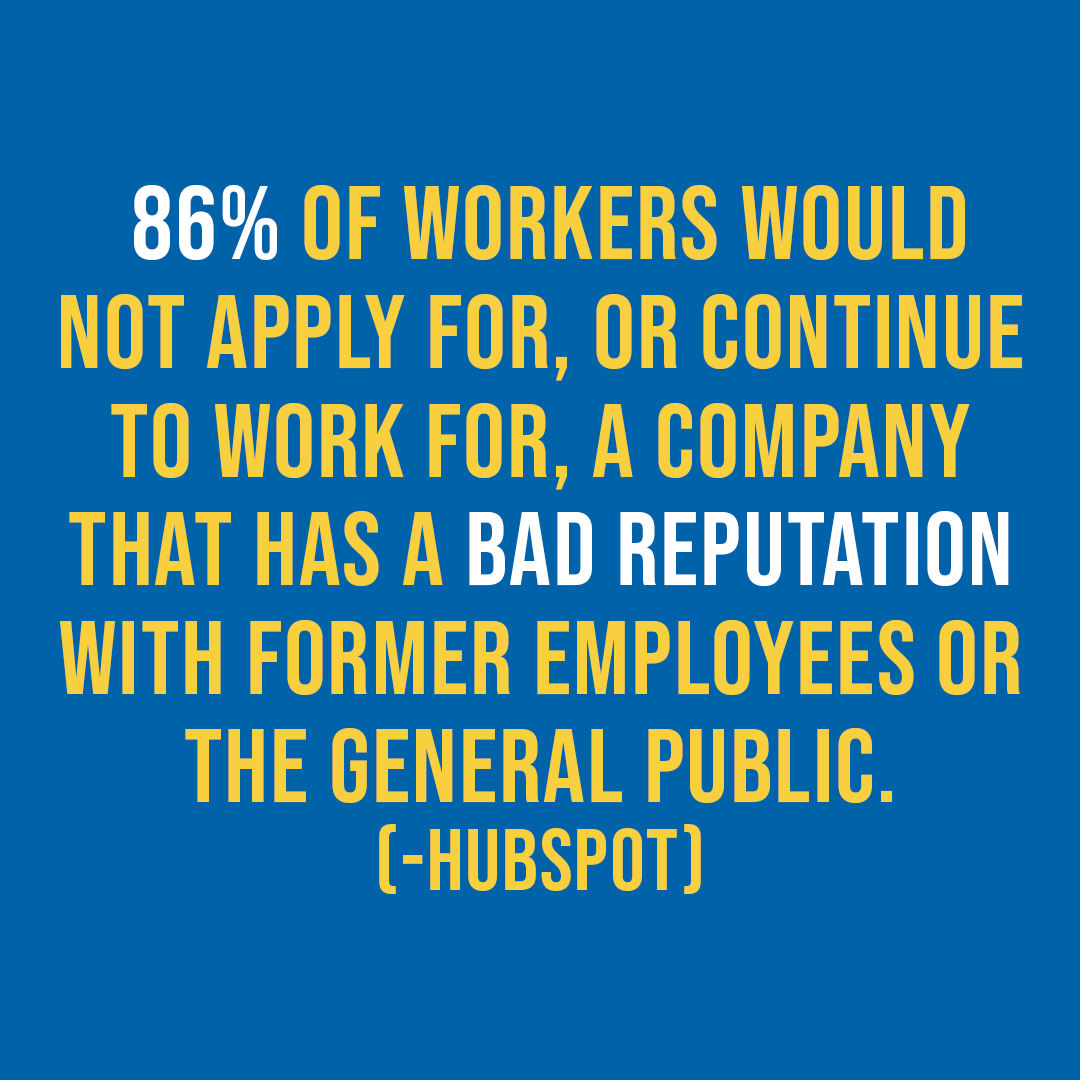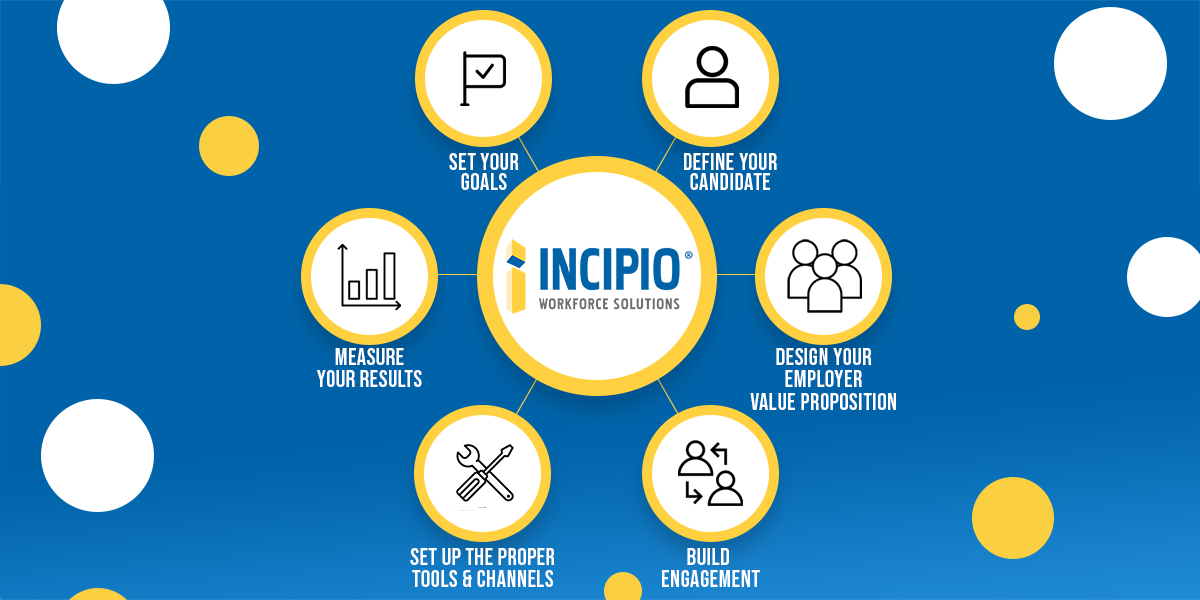Employer Branding
incipioworkstg
on
September 18, 2021

Do you have an employer branding strategy for your business?
For as long as competition has existed in the business world, an organization’s reputation has played a vital role in attracting and retaining customers. Reputation, or how others perceive you, can include ideas about products, services, leadership, team members, and prior interaction and exposure. On the other hand, a brand is how you present yourself to the world, reflecting how you want to be perceived or the value you hold. Companies use their brand to connect with customers through various ways, tapping into their emotional and intellectual needs, influencing them to purchase products or use services that the company offers. According to Forbes, some of the most valuable brands in 2020 were Apple (#1), The Walt Disney Company (#7), Nike (#13), Starbucks (#37). What is it about these brands that influence consumers to gravitate to them?
Employer branding is similar in that it communicates a company’s vision but relates to current and potential candidates rather than products and services. This type of branding defines what makes the company unique and desirable and outlines the company culture and values. According to the Society of Human Resource Management (S.H.R.M), the concept of employer branding or measuring what employees see as value is increasingly becoming more critical. The industry measurement to gauge employer branding is called an employee value proposition or EVP, which essentially “is part of an employer’s branding strategy that represents everything of value that the employer has to offer its employees.”
An effective employer brand communicates why an organization is a great place to work, creating a sense of pride for those that are a part of the team, and inspires potential talent to seek out a company for employment.
Employee experience is so much more than well-crafted talking points, more than Dress Down Fridays, Happy Hour Thursdays, and other company perks. Employer branding is about the overall experience of working for a specific organization. Looking at factors such as company values (sustainability, work-life balance, community involvement), innovation & technology, autonomy and ownership given to employees, remote working options, the effectiveness of leaders, performance feedback, and an employees ability to reach their potential within the organization, to name a few. Over the last few years, numerous websites and publications have popped up that rate employer branding or “Best Places to Work” by measuring different categories via anonymous surveys and reviewing company programs and policies.

Essentially, employer branding gives a peek into what it is like to work at an organization. Employer branding done right provides a glance into what employees expect in their workplace but also communicates what is expected as a team member. In this highly competitive employment landscape, this type of branding and measurement is crucial. LinkedIn Employer Brand Statistics Report states that 72% of recruiting leaders worldwide agreed that the employer brand has a significant impact on hiring. Yet, only 55% of small to mid-sized businesses have a proactive brand strategy in place. The concept of employee value proposition or employer branding is no longer an out of the box concept, it is an expectation of most candidates seeking employment.
The same LinkedIn report states the #1 obstacle candidates experience when searching for a job is not knowing what it’s like to work there. They trust current employees three times more than the company itself to give a more accurate picture of what it is like to work there.
When an employer brand is executed properly, a business will see positive impacts resonate across many recruiting and retention bottom-line numbers. LinkedIn research states that a strong employer brand reduces turnover by 28% and cost per hire by 50%.
Creating and executing an employer branding strategy takes time, introspection, and flexibility. Deciding who or what department is to oversee the process and execution will depend on several factors, such as the size of an organization, type of industry, the vision of the organization, the buy-in of the concept, and the company’s leadership. Sometimes having a third party assist in the process can provide an unbiased look at the organization and can help streamline this process.

Implementing a successful strategy starts with the following:
- Defining and understanding your recruiting goals (some suggestions below)
- ↑ Applicants
- ↑ Application completion rate
- ↓ Cost per hire
- ↓ Time to hire
- ↑ Employee retention
- ↑ Offer acceptance rates
- Build trust
- Defining your candidate
- What is their persona
- What motivates them
- What is their job search behavior
- What channels do they use to find companies hiring
- Who influences their decision
- What personality type are they
- What are their goals
- What skill sets do they have
- Design your Employee Value Proposition
- Compensation
- Upward mobility
- Environment
- Culture
- Values
- Benefits
- Build Engagement among current Employees
- Up to date Social Media profiles that include a place of employment
- Encourage employees to share their experience working for your company
- Highlight employees in blogs, social media
- Conduct company reviews
- Set up the proper Recruiting Tools & Channels
- Social Media
- Website
- Blogs
- Workshops
- Outsourcing
- CSM systems
- Measure your results.
- Using recruiting and retention metrics
- Touching base with the employee base
- Touching base with candidates throughout the process and afterward.
A company’s reputation matters now more than ever. Communicating your employer brand effectively shows the value you bring to the table. Understanding this allows a company to attract talent in a creative way that has a lasting financial impact. Employers no longer have the upper hand in recruiting talent, the candidate is the one in the driver’s seat, and organizations that don’t get with the program will be left in the dust.
——-
Incipio Workforce Solutions is a strategic partner in helping businesses thrive through recruiting, HR solutions, direct hire recruiting, employer branding, team building and more! Since 2015, Incipio has been on a mission to transform the way companies attract, engage, and delight their team members. Our professional services break down the challenges you face and create manageable goals, obtainable standards, and process improvements to reorganize, revitalize, and redefine what WAS into WHAT IS possible. Comprised of expertise in HR, Recruiting, Employer Branding, and Service, Incipio gives companies the tools they need to successfully manage their employee experience from interview to retirement. For more information on how we can help you and your business, call us at 502-409-4821 or email us at [email protected]

